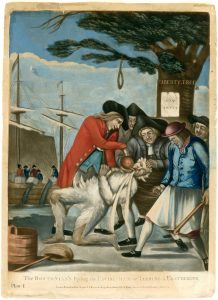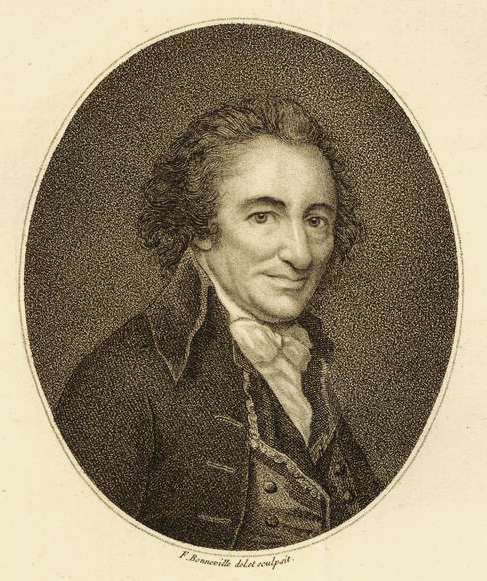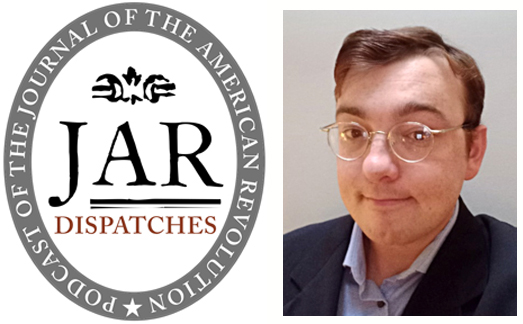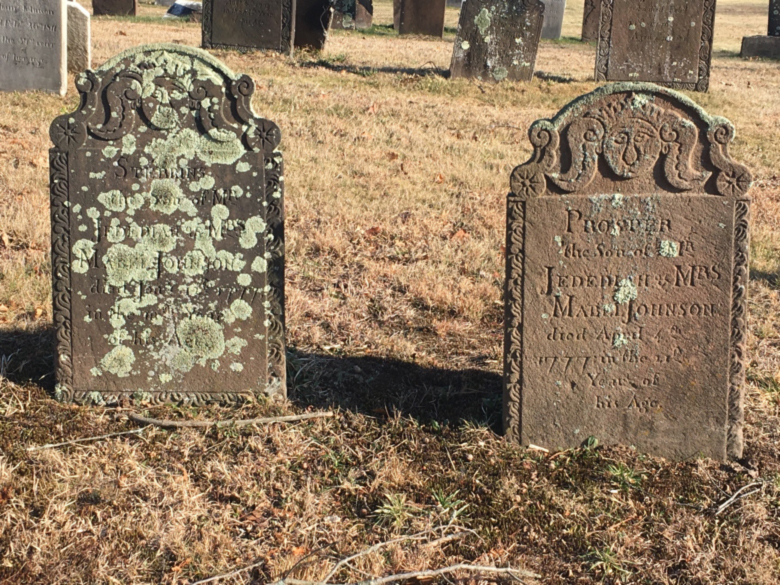Teaching the American Revolution in the United Kingdom comes with baggage. But British students respond to it ways that an American might not expect. I grew up in the United States and moved to the U.K. about twenty years ago. I have taught the American Revolution in four different institutions, working with both British and American students. What I’ve found is that while Americans tend to view the revolution (consciously or unconsciously) through a patriotic lens, the British view it primarily through a post-colonial one. Rather than defend their county’s part, British students tend to see the colonists’ cause as a just one.
No one comes at history with complete objectivity. There are many subconscious factors that play a role in how someone will respond to and interpret the past. In America the imagery of the revolution is everywhere. The star-spangled banner, the Founding Fathers on the cash in your wallet, the Liberty Bell, the “Don’t Tread on Me” flags. By British standards, it is in your face. The evocative words that resound from the revolution to our own day—freedom, liberty, “In God We Trust,” E Pluribus Unum—do not carry the same sort of historical weight in the U.K. as they do in the U.S. To be critical of the revolution in America is allowed, of course, but it still feels like a form of heresy. In Britain, saying that the revolutionaries were a bunch of privileged, tax-evading traitors would not be something that could get you involved in a barroom brawl in quite the same way.
But surprisingly (perhaps), that is not the prevailing attitude over here. What I’ve found is that students will tend to accept that the British were to blame long before they will leap to defend King George III or Lord North. Even during the Revolutionary War, there was a small but vociferous minority of British people who understood the colonists’ grievances and supported their cause (morally, at least). But what explains today’s acceptance that the Americans had a point is that most people here grow up with the values of post-World-War-II Britain rather than those of the eighteenth century. There is a firm belief in the importance of democracy, of representation, of the right to the freedom of speech, assembly, and religion. The collapse of the British Empire after World War II was resisted, but not on anything like the scale it might have been. There were exceptions, of course, but the British mainly saw that having fought two world wars to preserve democracy and ruling over an empire were hard things to reconcile. What most people learn about the British Empire in school now is that it was generally a bad thing. Even conservative British mega-commentators like Jeremy Paxman and Niall Ferguson describe the evils of the British Empire in most of the places it existed (though the latter especially is often criticized for not condemning it harshly enough).
My first experience teaching the American Revolution to British students was as a graduate student at the University of Oxford. I was an assistant in a seminar for undergraduates led by an Oxford don, Peter Thompson. This was in 2005, long before Zoom, but we had a video link with a parallel group at the University of Virginia led by the Jefferson scholar Peter Onuf. Both sets of students were intelligent and thoughtful. But I remember one debate about the Founding Fathers’ words in the Declaration of Independence, and later in the Constitution. The question was about how their fine words regarding freedom, liberty, and all men being created equal could contrast so starkly with their preservation of slavery. A student suggested that anyone could have foreseen that this dichotomy would tear the county apart in time.
One American student was quick to say that he would have signed the Declaration and Constitution just the same. He knew it was a tricky position, but he thought it would be worth the gamble to create a great nation founded on the ideal (if not the reality) of liberty and justice. It was a position that I don’t think many of the British students agreed with, or if they did, it wasn’t one they were prepared to voice. That again is not because the British record on slavery was any better or because attitudes here are more enlightened. Nor do I think that the American student thought slavery was anything other than an evil. It was, I think, more to do with the American student’s stronger willingness to see the good in the Founding Fathers’ action, perhaps due to a sense of pride in the nation they created.
Not every school in the U.K. teaches the American Revolution. Up to age thirteen, most schools in England follow a national curriculum where pupils might briefly encounter it as one of nine suggested case studies within a unit on Britain from 1745 through 1901 that is generally covered in just a few weeks in the middle of Year 9 (ages thirteen-fourteen). After that, History is an optional subject. Those who choose it tend to be taught modules or units of history in greater depth, rather than follow a broad chronological course like the AP History syllabi in the United States. From age fourteen onward (GCSE and A-Level), there is no definitive list of topics that all pupils will study. Different examination boards offer different selections of modules that schools can choose from. Very few students learn anything about the American Revolution.
I taught in one school that did devote a lot of time to it in Year 9. Each year, after several weeks of teaching the causes of the American Revolution, I asked my classes to write an essay in which they’d decide whether George III and his government’s policies were the most important reason for the outbreak of the War of Independence in 1775. Every year, nearly all the pupils would argue that King and his ministers were to blame.

I was confused and surprised. Was there a lack of critical thinking behind this? Each year, I tried to belabor the other side of the debate in our lessons. Surely, I thought, English pupils would want to blame the colonists a little bit for the outbreak of hostilities. After all, they tarred, feathered, and intimidated British officials. They broke onto a ship and threw large amounts of private property into Boston Harbor. When we looked at George III’s policies I tried to explain the reasons behind them. The Proclamation of 1763 that angered the colonists so was actually an attempt to avoid sending large numbers of British troops to America by preventing Indian wars. Unruly colonists established militias and built stockpiles of weapons. Would the pupils not wish to point out that the British had good reason to go to Lexington and Concord to disrupt them?
But each year the verdict was pretty unanimous. George and his ministers were behaving as unbearable tyrants—taxing the colonies without giving representation, sending troops, forcing colonists to quarter them in their homes, and passing laws without consulting them. Granted, this school was in a part of London (Hampstead) that has traditionally been left-wing in outlook with a reputation for champagne-socialism. Finding anyone willing to defend the Empire there was unlikely. But I have seen similar reactions in other parts of England as well.
I recently interviewed a Year 8 boy who had covered the American Revolution at another school. “What side do you think you would have been on if you were around at the time?” I asked. “The colonists’,” the boy replied. “Why?” “Well, because they didn’t want to be ruled over by the King, and I wouldn’t have wanted to be either.” I might have asked the boy whether the anger in the colonies was really about the King or if was about parliament’s policies, but I decided to keep it simple. “Why’s that?” “Well, he was taxing them all the time, and wasn’t letting them vote. So, they had a right to rebel.” Either by his own perception or by absorption of the ideas around him (probably a mix of both), it was as though he had read the social contract and taken it to heart.













13 Comments
Very interesting article!
When I recently submitted an article on the American Revolution to a UK historical publication the editor responded that they didn’t tend to publish many pieces on the topic. I found this somewhat surprising but quickly realized the well of British history is very broad and deep. Indeed, a more in-depth study of the journal’s contents revealed many topics that I never knew about even in the slightest degree. It would appear that educators there have quite a bit more ground to cover in the teaching of their nation’s history.
I find your student’s perspectives interesting (and perhaps similar to some Canadian views) on the subject that American colonials were just being “good Englishmen” in their actions preceding the war and even immediately afterward.
Douglas:
Just curious – What was the UK historical publication you were submitting work to? Thanks.
Journal of the Society for Army Historical Research. I am grateful they published my article. Since then there have been a few others as I recall. One was submitted by a student as part of an essay competition.
This is an interesting and a thoughtful article. When I taught U.S. Civil War history at the University of Central Arkansas from 1984 to 1999, I was struck by by the receptivity of most white students to the proposition that slavery was the primary cause of secession and the creation of the Confederacy. To see how post-colonialism has affected the thinking of young Britons encourages one to believe that past prejudices do not have to endure.
Having gone to school in the U.K. at the end of the last century, and having studied the Revolutionary War as part of my history degree, I think pupils’ views would have been much the same back then too. There’s an expectation among certain parts of the population in the US that expects modern Britons to be bitter about the Revolutionary War when the truth is most are ignorant or indifferent, we weren’t part of of the 18th-century army or government, they were the ones doing the fighting, not the average Briton. I think there’s an expectation that we have the same emotional connection to Redcoats as the Minutemen do to Americans, whereas to use they were just professional soldiers in another war, if we even think of them at all.
My experience of studying the Revolutionary War at University in the UK was interesting, the American students did comment that they found the way that it was taught more balanced, as you say nobody is free from bias, but we are perhaps more free from the emotional connection here perhaps. Or more readily able to be.
Excellent piece, and I’m glad to see that they still teach the Revolution in our classrooms. It allows youngsters to explore political and military themes unique to world history. My school didn’t cover the revolution at all, though it spent a year on the French, Russian, and German versions. There are a handful of assumptions, however, I would question. Do British youngsters really see the conflict through a “post colonial lense?” I doubt it. This appears to be wishful thinking. It is fashionable to interpret every aspect of British history through this warped lense, often to the detriment of the British. But this is a very modern pivot. We were taught the Empire was a positive period in our History until recently. After all, the Queen’s father was crowned Emperor and remained so until 1947. There is a solid case to be made (albeit not one I agree with) that George III and Lord North’s stance was reasonable, and the Revolution was more about preserving the privileges of a small white elite than it ever was about liberty for the masses.
I would also question the phrase “the British were to blame”. This is a trend I’m seeing more often in education and book writing. There is a powerful urge to nationalise history and turn it into a “them vs us” argument. This strikes me as dangerous. It is important to remember this was a Civil War, not a fight between nations. It is just as incorrect to view the conflict as America defeating Great Britain as it is King George oppressing a few intrepid colonists. As a result, I would use the word “blame” with caution. Daniel’s students come from the uber-bourgeois bastions of Bedford School and Hampstead. I wonder if the questions were posed to Comprehensive school pupils in Grimsby or Shepherds’ Bush instead of the fee-paying schools above, the replies would have been the same? I suspect not, and that class, as always, has a lot to do with how individuals perceive history. That, though, is a separate rabbit hole.
Finally I have to warn Daniel that in Britain, it is easy to get into a barroom brawl over far less than labelling Patriots “tax evading traitors.” Try telling the landlord his beer is warm and has too much foam on top. It will spark a new revolution.
I’m an early Americanist and a Brit, educated in England in the 70s. Sounds about right. A book was published in the 60s comparing US and UK textbooks on the Revolution–wish I could recall the title!– and concluded that “It’s George III’s fault” was being taught on both sides of the Atlantic. Every American I’ve met assumed I had been taught a chauvinistic story!
It’s interesting that many assume that our telling of events would be similarly patriotic to ‘our’ side
Fascinating article. Never expected it.
In truth, such British willing, and to some greater or lesser degree, supporting the colonial position in the American Revolution are being only sensible and consistent; inasmuch as they had their own Revolution ousting the Stuarts, including decapitating Charles the First, and to this day (oft times with some, that is) heaping such vitriolic hatred on Queen Anne; including mocking her miscarriages and and still -births, making one wonder if these weren’t perhaps medically engineered; and then going on to import replacement royalty from Germany just to avoid even the slightest possibility of Catholic toleration. From that point of view and given these circumstances, it would be hard to get too big hearted about royalty without sounding hypocritical. This is not to say there were and are other grounds for taking the colonial, or even the British position in the Am. Revolutionary War; only let us not forget about what in its origins led up to what.
Good perspective. The hindsight of students (and adults) is always 20–20. Clearly, they’ve been affected by jingoistic teaching that apparently spans the Atlantic.
Of course, US-based historians contribute to the bias by insisting on calling the terrorist insurgents “patriots” (and sometimes “Patriots” with the capital P), as if Loyalist Americans and Native Americans (most of whom opposed the insurgents) weren’t patriotic. If the British had suppressed the insurgency, the rebels would have been known as traitors and freeloaders.
It would be interesting to get a count of how many JAH authors bias their work by using the term “patriots.”
“Jingoistic teaching” nails it. Thank you.
How much has Brexit played into the narrative?
Asserting independence versus an out-of-touch but determinedly centralising political authority that requires the acceptance of the superiority of its courts does have a familiar ring to it…